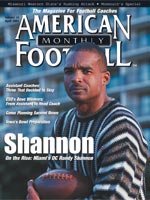AMERICAN FOOTBALL MONTHLY THE #1 RESOURCE FOR FOOTBALL COACHES
Article CategoriesAFM Magazine
|
Growing the Family TreeEmporia State\'s Dave Wiemers continues the family businessby: Patrick Finley © More from this issue Itís not the coaching Dave Wiemers minds. Itís what so many coaches go through when they become a head coachÖ You see, the pressures of diagramming a game plan and mentoring Division II players at Emporia State isnít that difficult to him. Drawing up plays, inserting the right personnel Ė thatís easy. Youíd think it was easy too if you grew up where Wiemers did, sharing a house with the same family that he did. Coaching is work, but it isnít work. Itís second nature. Wiemers was born into the family business. His father is a coach, as is his mother. Larry Wiemers and his wife, Sandi, met and married, and had three children Ė Dave, his brother Jon and his sister Susan. Larry Wiemers was, and is, a legend in Kansas high school football history. He coached Clay Center (Kan.) High School Ė whe....The full article can only be seen by subscribers. Subscribe today!
|
|
|||||||
| HOME |
MAGAZINE |
SUBSCRIBE | ONLINE COLUMNISTS | COACHING VIDEOS |
Copyright 2025, AmericanFootballMonthly.com
All Rights Reserved





